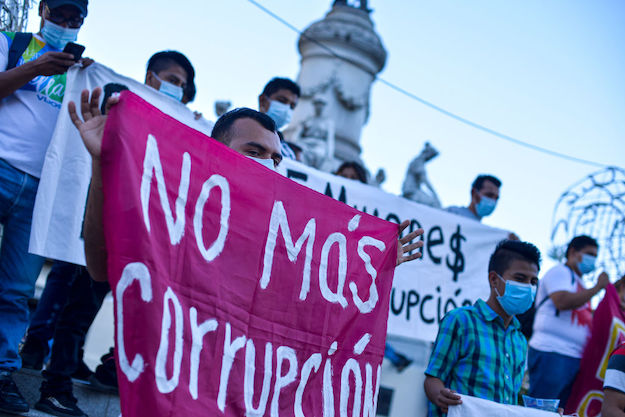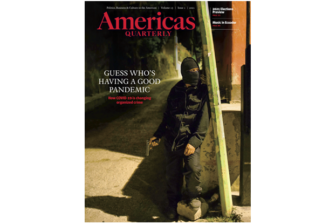“A leader that isn’t ready to fight corruption can’t be a U.S. ally.” That was Juan Gonzalez, President Joe Biden’s national security advisor for the Western Hemisphere, speaking to the El Salvador-based news outlet El Faro just a week after inauguration. His message, meant for the leadership of that country and the region as a whole, was clear.
Nayib Bukele won El Salvador’s presidency on an anti-corruption platform, excoriating the malfeasance of the two wartime parties that had governed the country since the 1980s. Though Bukele delivered early on his promise to create an anti-corruption commission, he has since begun to act like an autocrat himself, vilifying critics in the press and human rights groups, painting the courts and legislature as enemies, and ordering the military to occupy the legislative assembly in 2020. After a fatal shooting at a recent opposition rally, he accused his opponents of staging the attack themselves.
If his extremely high approval ratings are any indication, Bukele’s tactic of wielding anti-corruption like a bludgeon against opposition parties, bolstering his popularity and undermining checks on his control over the state, seems to have worked. If his “New Ideas” party wins the legislative elections this month, as expected, he may be able to consolidate his power over all three branches of government.
Bukele’s move to collaborate with the Organization of American States (OAS) to create the International Commission against Corruption and Impunity in El Salvador (CICIES) in 2019 thus seemed more like a token gesture. The CICIES had few of the ingredients that had made its neighboring predecessor, Guatemala’s International Commission Against Impunity (CICIG), a success: no mandate for independent investigation, no ability to help prosecute cases, no mandate to publicly press officials on malfeasance and virtually no collaboration with civil society. In fact, Bukele never presented the CICIES agreement to Congress for ratification; he merely relegated the Commission to an agreement based on the good will of the executive branch and the secretary-general. This decision deepened the perception among civil society organizations that the commission was a showy tool of the executive rather than a binding and independent mechanism.
At the same time, the need for such an outside anti-corruption commission has become more apparent. Impunity in El Salvador runs deep. To date, the vast majority of serious human rights violations committed over the past decades remain unpunished. One study found that only 10% of cases brought before the attorney general between 2013 and 2018 led to a conviction. The country’s notorious street gangs persist. Although homicides have come down dramatically under the Bukele administration, investigative journalists uncovered evidence in September that the president may have cut a deal with MS-13 gang leaders, granting them better prison conditions in exchange for reduced killings and electoral support.
But CICIES, with its strong team of national and international judges, investigators and auditors, has shown it has teeth. In November, drawing on documents uncovered in cooperation with CICIES’ forensic audits, Salvadoran prosecutors raided 20 government offices, including the Health and Finance Ministries, acting on reports of fraud and illegal contracts in the handling of emergency COVID-19 funds. Bukele officials were implicated in massive corruption.
Though downplayed by Bukele, the raid inspired other initiatives, and a coalition of civil society organizations has now developed a bill giving CICIES greater autonomy and expanded capacity. Presented to Congress this month, the measure would consolidate the Commission’s independence, strengthen its investigatory powers and create a pathway to participating in prosecutions with the attorney general. If signed into law, it would require all state institutions to collaborate with CICIES on investigations and ensure greater transparency in the Commission’s work and finances.
El Salvador now stands at a crossroads. If the proposed legislation is not passed and the Commission’s dependence on the executive is not resolved, it may well become a politicized tool for undermining the rule of law.
As of writing, however, the proposal has ignited renewed interest in the fight against corruption and the future of CICIES. A broad coalition of human rights organizations, NGOs, think tanks, universities and community organizations has united behind the proposal. Many Salvadoran legislators have, for the first time, publicly supported an international commission, with some calling for a body backed by the United Nations rather than the OAS. The attorney general has also chimed in, saying that, “If the legislative assembly establishes that there is a need to reform the CICIES, that it must be improved, that it must be given new tools, well we cannot be against that.” Praising the dialogue around strengthening CICIES as one of El Salvador’s “glimmers of hope,” former United States Ambassador to El Salvador Mari Carmen Aponte wrote in El Faro that she had “no doubt that the newly inaugurated Biden administration will offer its determined support for this and similar efforts.”
As with CICIG before it, expanding CICIES’ powers would create space for civil society and honorable public officials to do their jobs without fear, showing Salvadorans that corruption can be punished. The inauguration of the Biden administration, which has pledged to strengthen the fight against corruption and autocracy, thus comes at a propitious time. As the United States works to salvage its own democracy, it has an opportunity to support Salvadorans in their own fight against autocracy, impunity and corruption. The future of democracy in El Salvador depends on it.
—
Bullock is the executive director of the Cristosal Foundation, an El Salvador-based human rights organization. Call is associate professor and chair of the International Peace and Conflict Resolution Program at the School of International Service at American University.







